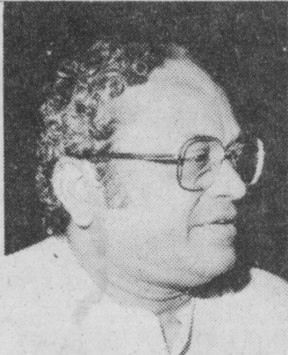
Cingireddi Narayana Reddy, popularly known as CiNaRe, was an Indian Telugu-language poet, writer, and critic. He had produced over eighty literary works including poems, prose-plays, lyrical plays, translations, and ghazals. He was also a professor, film lyricist, actor, and Rajya Sabha politician. He also served as the Vice Chancellor of Telugu University.
Gurram Jashuva was a Telugu poet. He is legendary figure in the Telugu literary world. With his immense wisdom and through the struggle he faced due to the caste-based discrimination, Jashuva wrote his poetry with a universal approach. He was called the "Poet of the Millennium" for his timeless pieces of poetry and literature.

Telugu literature is the body of works written in the Telugu language. It consists of poems, short stories, novels, plays, and song lyrics, among others. There is some indication that Telugu literature dates at least to the middle of the first millennium, the first extant works are from the 11th century when the Mahabharata was first translated to Telugu from Sanskrit by Nannaya. The language experienced a golden age under the patronage of the Vijayanagara king-poet Krishnadevaraya.

Arudra was an Indian author, poet, lyricist, translator, publisher, dramatist, playwright, and an expert on Telugu literature. He is also known for his works in Telugu cinema as a lyricist, dialogue writer, and story writer. He received the Sahitya Akademi Award in 1987.

Rāvūri Bharadvāja was a Jnanpith award winning Telugu novelist, short-story writer, poet and critic. He wrote 37 collections of short stories, seventeen novels, four play-lets, and five radio plays. He also contributed profusely to children's literature. Paakudu Raallu, a graphic account of life behind the screen in film industry, is considered his magnum opus. Jeevana Samaram is another of his popular works.
Madhurantakam Rajaram was an Indian author who is considered one of the foremost of modern Telugu short story writers. He is the winner of Sahitya Akademi Award of 1993 and Katha prize for short stories for the years 1991 and 1993.
Nayani Krishnakumari was an Indian scholar, poet, researcher, speaker in Telugu and an active participant in literary and cultural organizations. She served several institutions in various capacities. She received several awards such as Swarnakankanam, instituted by Desoddharaka Kasinathuni Nageswara Rao, Best Telugu Writer award from Potti Sreeramulu Telugu University, and Sahitya Akademi among others.

Madiraju Ranga Rao is a scholar of Telugu Literature, associated with Classical Literature, Indian Poetics, Modern Poetry, Novel & Criticism and Studies in Sanskrit Literature.
Jandhyala Papayya Sastry was an eminent Telugu writer and lyricist. He was popularly known as Karunasri because his writings expressively show compassion, one of the nine Rasas. His famous kavyas include Pushpa Vilapam and Kunthi Kumari.

Viswanatha Satyanarayana was a 20th-century Telugu writer. His works included poetry, novels, dramatic play, short stories and speeches, covering a wide range of subjects such as analysis of history, philosophy, religion, sociology, political science, linguistics, psychology and consciousness studies, epistemology, aesthetics and spiritualism. He was a student of the illustrious Telugu writer Chellapilla Venkata Sastry, of the Tirupati Venkata Kavulu duo. Viswanatha's wrote in both a modern and classical style, in complex modes. His popular works include Ramayana Kalpavrukshamu, Kinnersani Patalu and the novel Veyipadagalu. Among many awards, he was awarded the Jnanpith Award in 1970, the first for a Telugu writer, and Padma Bhushan in 1971.
Syed Saleem is a Telugu writer. He has written twenty five novels, about 250 short stories and more than 150 poems. His fiction has been translated into English, Hindi, Marathi, Oriya, Malayalam, Kannada and Tamil languages. His work is characterized by his humanitarianism and soothing poetic expression. One of his best known works is his Telugu novel Kaluthunna Poolathota, which had won the * Sahitya Akademi Award in Telugu, 2010.

Dr. Karnati Lingaiah born on 10 June 1944 in Narasimhapuram Village, Nalgonda District, Telangana, India. He is a retired Lecturer in Economics and recipient of State Best Teacher Award given by Government of Andhra Pradesh, India in 1984. He is also a poet who has written books in Telugu Language. He has authored about 17 books in Economics and 18 books in Telugu Literature.

Vempalli Gangadhar is a writer from Kadapa district of Andhra Pradesh. He has been awarded Sahitya Akademi's Yuva Puraskar for 2011 for his short-story collection "Molakala Punnami".
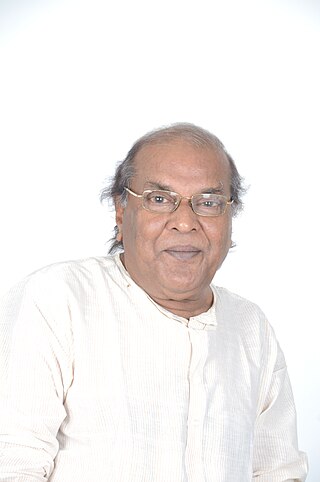
Vegunta Mohan Prasad, was a Telugu poet, critic, translator and writer. He was known by his pen name 'Mo'.
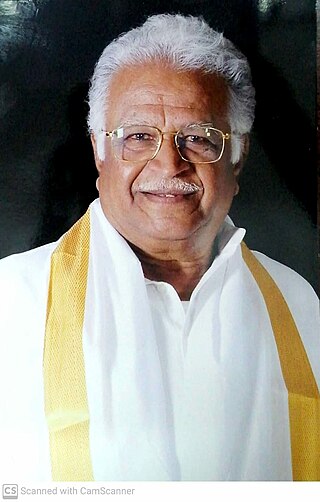
Kolakaluri Enoch is an Indian writer, teacher, and former Vice Chancellor of Sri Venkateswara University, Tirupati. He was honoured by the Government of India, in 2014, by bestowing on him the Padma Shri, the fourth highest civilian award, for his contributions to the field of literature.

N. Gopi is an eminent Indian poet, literary critic in Telugu and Sahitya Akademi Award recipient. He has also been in the University system as a professor and Dean since 1974, until retiring in 2008. He has also held the post of the Vice Chancellor of Potti Sreeramulu Telugu University, Hyderabad. Gopi's poetry displays nativity and national outlook.
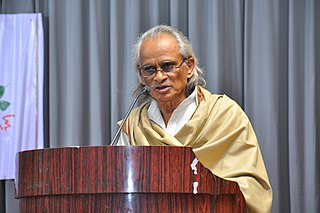
K Siva Reddy is a Telugu poet from India who won Sahitya Akademi Award in Telugu, 1996 for his Poetry work Mohana-O-Mohana and was awarded the Saraswati Samman in 2018 for his poetry collection Pakkaki Ottigilite.
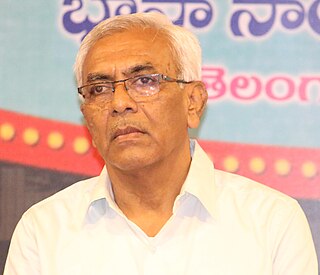
Nandini Sidda Reddy is a teacher, writer, poet, songwriter and social activist from the state of Telangana, India. He is known for promoting Telugu culture. Several of his songs have been featured in Telugu language films. He was one of the leaders of the Telangana movement to make Telangana a separate state from Andhra Pradesh, which took place in 2014. He was the first Chairman of the Telangana Sahitya Akademi.
Shaik Khaja Hassan, popularly known by his pen name Devi Priya, was an Indian Telugu-language poet and journalist known for his political satire. He was a recipient of the 2017 Sahitya Akademi Award for his work Gaali Rangu. Some of his famous works included Adhyakshaa Mannichandi, Gareebi Geetaalu, and Amma Chettu Chepa Chiluka.

Asavadi Prakasa Rao was an Indian poet, critic, translator and scholar, who is known for his poetry and prose works. He is noted for his significant contribution to Telugu and Sanskrit literature. In January 2021, he was awarded India's fourth-highest civilian award the Padma Shri in the Arts and Literature category. As Ashtavadhani, he has given 170 performances and has written and published 50 books across various genres. His most notable literary contribution is his performance of Avadhanam – a literary performance. He has received an honorary D Litt from Potti Sreeramulu Telugu University and a Distinguished Teacher award from the Department of Higher Education, Government of Andhra Pradesh.













